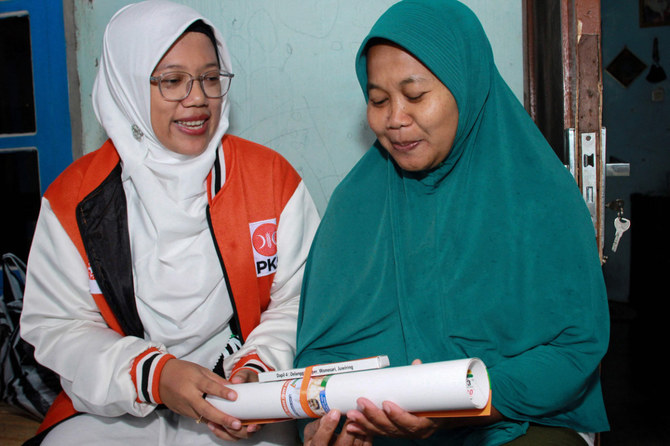JAKARTA: Indonesia’s election lineup next month will be dominated by men, but a number of women are trying to break into a political scene long overshadowed by patriarchal elites.
More than 200 million people are eligible to vote in the February 14 election, with slightly more than half of them women, according to the country’s election commission, yet only a handful of women represent them in parliament.
“We have a lot of dedicated and capable female politicians, but there are still many who consider women weak and lacking leadership qualities,” legislative candidate Lingga Permesti told AFP from the town of Klaten, where she is running for a seat.
“That is the reality, especially in (rural) regions,” the 37-year-old said.
Indonesia, long known for its political nepotism, has had one woman president — Megawati Sukarnoputri, the daughter of Indonesia’s founding father and first president Sukarno.
But she was not directly elected, rising to the highest office from the vice presidency after the removal of Abdurrahman Wahid in 2001. While her party retained high levels of popularity tied to her father’s legacy, she lost two subsequent presidential races.
In next month’s vote, all 18 political parties contesting 580 lawmaker seats have collectively met a mandated nationwide quota of 30 percent women contenders, according to the election commission’s final list.
Women have held ministerial portfolios, the current house speaker is a woman and the proportion of women lawmakers rose to one in five in 2019, from less than one in 10 in 1999. That compares to a worldwide average of just over one in four, according to data from UN Women.
Despite the recent strides, women’s representation is still not being taken seriously in Indonesia, according to experts.
Some women candidates say they are being treated like they are extraneous.
“During one of my campaigns, a male district head told the people there that I was just a supplementary candidate. That I was in the contest just to help my party to meet the representation quota,” Permesti told AFP.
In the country’s first two presidential debates, the three men battling for top office — Defense Minister Prabowo Subianto and former provincial governors Ganjar Pranowo and Anies Baswedan — did not once mention reproductive health care or equal opportunities.
Only one party has met the quota for women candidates for the nationwide legislative elections in each of the country’s 84 electoral districts, according to Koalisi Masyarakat Peduli Keterwakilan Perempuan, a civil society group focusing on women’s representation.
The election commission has also in some instances allowed fewer women candidates than required, reinforcing a reluctance to bring more women into politics, said election expert Titi Anggraini from the University of Indonesia.
“2024 marks a decline in the affirmation of women’s representation, indicating the country’s regression in fulfilling political rights,” she said.
Indonesia’s “patriarchal society” has stemmed from entrenched attitudes introduced during the decades-long Dutch colonial era and then reinforced during Suharto’s autocratic rule, said Irwan Martua Hidayana, an anthropologist at the University of Indonesia.
“If we take a look at the history, some studies showed that Indonesia had egalitarian relations between men and women before colonialism changed it,” Hidayana said.
Some women speak of positive experiences in politics but say they were not reflected across the political spectrum.
Permesti said she was afforded a wide range of opportunities to polish her skills in her Prosperous Justice Party, an Islamic party, but not all were “ready to give women such spaces.”
Anindya Shabrina, a 28-year-old legislative candidate for the Labour Party, said she once declined to join another major party because of condescending attitudes from male politicians.
“I hope all parties will be more accommodating toward women in politics,” she said, calling for political education for women so their careers can begin at the grassroots level.
While millions of women will head to the polls across the archipelago next month, some say their status in Indonesian politics still leaves a lot to be desired.
“We have had a female president, lawmakers, but it needs to be improved,” said Permesti.
“I hope that in 2029, we’ll have a female presidential or vice presidential candidate.”


















